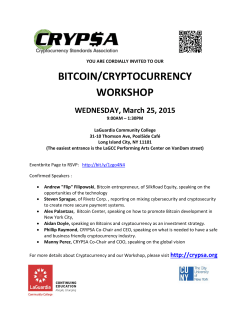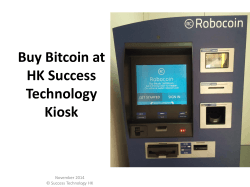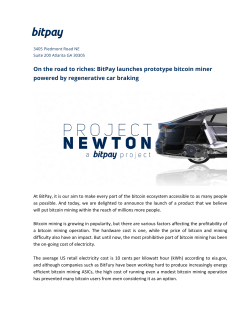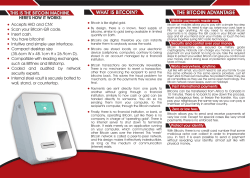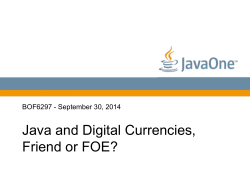
Document
Are You Ready for Bitcoin? (Is the World Ready for Bitcoin?) Bebo White SLAC National Accelerator Laboratory/ Stanford University bebo@slac.stanford.edu NUST, March 2015 NUST, March 2015 NUST, March 2015 Who owns Bitcoin? Why?/Why Not? NUST, March 2015 https://www.google.com/search?q=bitcoin+sucks ~2,400,000 results https://www.google.com/search?q=bitcoin+rocks ~52,400,000 results NUST, March 2015 What is Bitcoin? • Designed for an “Internet Society” using Internet technologies • Decentralized and independent of “state currencies” • Excellent for anonymous transactions like “hard currency” (i.e., unlike credit cards) • Excellent for E-Commerce - online exchange, no specific currency, micro payments • Easily convertible to “state currencies” NUST, March 2015 People are using it… • Not just for illegal activities (e.g., Silk Road) • Some financial analysts advise portfolio diversification with BTC • Sacramento Kings - customized jersey (.37 BTC) • Egifter - $500 Hyatt voucher (.601 BTC) • Lamborghini Newport Beach - pre-owned Tesla Model S (91.4 BTC) • EVR Gastro-Lounge - Vanilla Mint Julep (0.18 BTC) NUST, March 2015 NUST, March 2015 NUST, March 2015 NUST, March 2015 First, a quick look at money… NUST, March 2015 Token Money • Represented by a physical object (token) such as a banknote, coin, traveler’s check, etc. • Without that token, the value is lost • No intermediary is required for spending • BUT - requires faith in the ISSUER, usually a government or a bank NUST, March 2015 Notational Money • Represented by a notation in a ledger, passbook or database (e.g., a bank account) • Notational money cannot be lost • BUT - requires an intermediary (bank or clearing house) for spending • ALSO - requires faith in the MAINTAINER of the ledger NUST, March 2015 Hybrid Money • Requires BOTH a token AND a ledger account (e.g., personal check, stored value or gift card) • Can be lost AND requires faith in the ISSUER • AND requires an intermediary (bank or clearing house) for spending NUST, March 2015 Virtual Money (?) • • • No token • No intermediary required for spending No ledger No issuer, no government backing (or supervision) BUT • Is this even possible? • Who creates the money? Why is it money? • Without a token or ledger, how do you know how much you have? What is its value? • How do you know the spender is the owner? • What prevents spending the same money twice? NUST, March 2015 Another reason to backup… • Your money is just a string of bytes (data) on your device • Device failure means your money is gone • Device intrusion means your money can be stolen NUST, March 2015 NUST, March 2015 Analogy: Real Estate ownership is defined by a “chain of title,” a sequence of deeds • Land leading from the original owner to the present owner • Deeds are recorded in the Land Registry • Ownership determined by searching the Registry • The Land Registry is, in effect, a ledger holder • If the Registry is altered, ownership can be lost • Double-selling is prevented by timestamps NUST, March 2015 Distributed Registry • Suppose we broadcast ALL deeds to thousands of nodes of a decentralized public network? • IF the deeds are genuine AND the network members agree on the chain of title, THEN we can tell who owns a piece of property • Ask the network and count the responses - if a majority say that someone is the owner, then they are • There must be enough honest members that false responses cannot dominate (or they have some incentive) • The registry is NOT under government control NUST, March 2015 A Little Math - Hash Functions • A “hash” is a short function of a message • BUT: a hash is not uniquely reversible • Many messages have the same hash • Hash function H produces a fixed size hash of message M, usually 128-512 bits • h = H(M) NUST, March 2015 One-Way Hash Functions • Hashes are easy (fast) to compute but computationally difficult to invert • Should not be able to find any message corresponding to a given hash • Bitcoin uses a well-known published hash function SHA-256, which produces 256 bit hashes NUST, March 2015 A Little More Math/CS Asymmetric Encryption • Same as public-private key encryption • Provides the security in PKI/certificates, HTTPS, secure e-mail, digital signatures, etc. • Everyone has a public key (which they openly share) and a private key (which they protect) that are linked by very complex mathematics • Insures end-to-end security, non-repudiation, etc. NUST, March 2015 What is Bitcoin Really? • No physical object, not even a character string • “A chain of digitally signed transaction records leading from the original owner to the current holder” - similar to a chain of land deeds • The transaction records contain • Hashes that are difficult to find AND • Virtual owner IDs, called addresses • There is NO bitcoin registry, NO centralization • Bitcoin blockchains are broadcast to everyone; anyone can verify them NUST, March 2015 Bitcoin Protocol • Bitcoin was invented in 2008 by an anonymous person or team named “Satoshi Nakamoto” • The bitcoin protocol for generating and exchanging bitcoin is implemented in publicly available, open source software • Anyone can obtain and run a bitcoin client NUST, March 2015 Bitcoin Addresses • Bitcoin software generates bitcoin addresses of 25-44 characters for users • Sample address: 1BBsbEq8Q29JpQr4jygjPof7F7uphqyUCQ • The address is actually an elliptic curve public key; a 44 character key is as secure as a 7000-bit RSA key • To send bitcoins, user specifies a receiving address and amount then clicks “send” • To receive bitcoins, just tell the sender your address! • Addresses are not registered to users. A user can have a different address for every transaction NUST, March 2015 NUST, March 2015 NUST, March 2015 NUST, March 2015 So if you want to pay me something… NUST, March 2015 How do you get bitcoin? • Sell something • Salary (?) • Use a bitcoin exchange (including bitcoin ATMs) • Bitcoin mining NUST, March 2015 Bitcoin Mining (1/4) • Bitcoin blockchain begins with data “mined” by using a large number of hash function computations • “Mining” software is run on mining machines • A “miner” tries many different (e.g., 10^15) numbers, trying to find one whose hash value is less than a given threshold (A); a “brute force” computation • Verified success is rewarded with a number of bitcoins (N) NUST, March 2015 Bitcoin Mining (2/4) Miner includes N BTC x = blockchain in “y” for themselves y= proposed added block n = additional number (nonce) Miner broadcasts solution A = threshold value to network for N = miner’s reward verification find n such that: N began at 50 and H(x,y,n) < A is halved every 210,000 blocks NUST, March 2015 Bitcoin Mining (3/4) • Example: problem or “proof of work” • Find a number (nonce) so that the cryptographic hash of the block and the nonce starts with some required number of binary zeros (e.g., 40) • Once solved the miner transmits the block to the network for verification, collects reward, and starts on new block NUST, March 2015 Controlled Bitcoin Inflation NUST, March 2015 Bitcoin Mining (4/4) • The threshold (A) adjusted every 2 weeks (to establish rate of 6 blocks/hour) • Therefore, bitcoin hashes are progressively more difficult to find (i.e., finding “n” more difficult); part of finding “n” involves verifying that no bitcoin transacted in block “y” has already been spent in blockchain “x” (Merkle trees) • There will never be more than 21 million BTC. (2*50*210,000); divisible into units as small as 1/100 millionth of a BTC NUST, March 2015 Merkle Trees MacMania 17, Somewhere@Sea, June 2014 NUST, March 2015 NUST, March 2015 NUST, March 2015 NUST, March 2015 NUST, March 2015 Is this really different from stock market, currency market, commodities market fluctuations? NUST, March 2015 Bad things happen - Mt. Gox vs. Bernie Madoff Willie Sutton would use bitcoin NUST, March 2015 Possible Vulnerabilities • No way to reverse a transaction without the payee’s cooperation • Software bugs • Bank robbery by hackers (e.g., Mt. Gox) • Malware attacks against wallets • Government attempts to control • Silk Road raided by FBI in October 2013 • Competing digital currencies easy to make (forks) - Auroracoin, Dogecoin, Namecoin, Primecoin, and others - imitation is flattery NUST, March 2015 NUST, March 2015 Possible Future of Bitcoin/ Virtual Currencies (Social) • For the world’s unbanked, there is no choice • For small businesses, freelancers and startups in developing nations, there is no choice • When you have choice, it is hard to imagine those without • New generation growing up with instant expectations, who are or will be disillusioned by huge economic bailouts • From stones to precious metals to paper to bytes NUST, March 2015 Possible Future of Bitcoin/Virtual Currencies (Economic/Political) • A future with digital currencies and decentralized stores is guaranteed - people trust math over people • National adoption of decentralized currencies would bring political transparency and economic neutrality • Developing nations seeking to curb corruption and break free of economic dependence on other countries could see potential in these technologies NUST, March 2015 Summary - the 5 Elements of Bitcoin • Currency - send units of value, convertible, divisible • Commodity - scarcity stores wealth, market fluctuates with speculation • Brand - marketing message, community and sharing knowledge • Protocol - decentralized trust on the block chain • Technology - services and solutions implemented and integrated NUST, March 2015 I own bitcoin - why not you? NUST, March 2015 Thank You! Questions? Comments? bebo@slac.stanford.edu NUST, March 2015
© Copyright 2025

